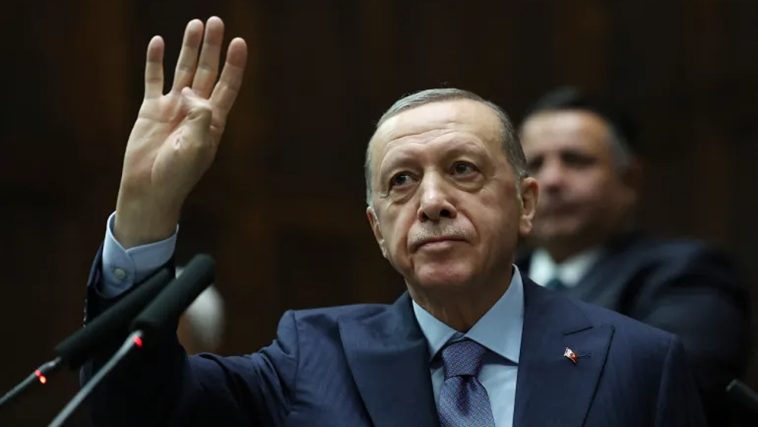On Wednesday, President of Turkey, Tayyip Erdogan, gave a statement addressing the escalating situation in Gaza. He accused Israel of operating as a ‘terror state’, alleged war crimes, and claimed violations of international regulations by Israel in Gaza. These harsh words signify Erdogan’s mounting dissension against the Israeli leadership and their Western supporters.
Erdogan’s docket currently holds a meeting with German Chancellor, Olaf Scholz, in two days. Prior to this assembly, he expressed severe objections to the actions taken by Israel’s military.
According to Erdogan, they launched ‘the most dishonorable assaults in human history’ against the Palestinian group, Hamas. He suggests that these actions were perpetrated with boundless support from Western countries.
JUST IN: Turkish president tells Israel “YOUR END is near.”
Hey Israel, you have a nuclear bomb and you are threatening with this. We know this. YOUR END IS NEAR…whether you have nuclear weapons or not. You're on your way out.”pic.twitter.com/s4tpOQX1xW
— Chuck Callesto (@ChuckCallesto) November 15, 2023
Erdogan’s perspective aligns with the long-standing stance of his nation – Turkey. He firmly attests that Hamas cannot be regarded as a terrorist organization.
Rather, he defines it as a political entity that previously arose victorious in past elections. Backing this statement, the Turkish government maintains connections with several Hamas members and advocates for a resolution to the Israeli-Palestinian strife through a two-state approach.
Erdogan’s official visit to Germany sets a landmark as it will be his first journey to a Western nation since the onset of the Gaza conflict, triggering a response from Israel on October 7. This occurred following suspected provocations from Hamas. As it stands, Germany has shown unwavering solidarity towards Israel, expressing concern over the repercussions of military activities on Gaza’s civilian inhabitants.
With deep concern, Erdogan addressed a larger issue identified with Western perception, more specifically pinpointing the United States. He firmly noted, ‘Sadly, the U.S. continues to take a distorted view on this matter.’ He also conveyed his intent to reach out to the leaders of some nations who decided to withhold their vote during last month’s United Nations General Assembly meeting concerning a proposed aid ceasefire in Gaza.
Further, Erdogan took it upon himself to challenge Prime Minister Benjamin Netanyahu, asking the leader to reveal whether Israel possesses any nuclear weapons. In his bold statement, Erdogan predicted that Netanyahu’s tenure as Prime Minister could potentially be nearing its terminus, although he fell short of providing any substantiation to this claim.
Moreover, Erdogan daringly drew an analogy between the ongoing strife between Israel, a state predominantly made up of Jewish citizens, and the Palestinians, to a broader global conflict between Christians and Muslims. This he explains articulates the crisis as being an issue of the ‘cross versus the crescent’. Critics, however, could assert that this rationale oversimplifies, and potentially exacerbates, the complex historical, political, and religious dynamics at play.
These latest declarations by Erdogan unequivocally reflect his disagreement with the aggressive Israeli action towards the Palestinian entity of Hamas. Furthermore, the Turkish leader’s insinuations about western nations enabling such actions offers a less than subtle critique of their foreign policy strategies.
Echoing other voices within the international community, Erdogan expresses his own anxieties about the potential impact of the Israeli-Gaza conflict on the civility of the larger region. Reiterating the need to restrict the destructive impact of military operations on Gaza’s non-combatant population, he makes clear his sympathies.
In vocally supporting Hamas, Turkey’s leader may be signaling a perception of Western nations as potentially unfair or even biased against the group. Erdogan’s insistence that Hamas is a political party, not a terrorist entity, presents a position that attempts to shift the narrative on the discourse around this issue.
Erdogan’s scheduled visit to Germany, a renowned Western country, becomes an event of notable significance amid his escalating critique towards Western nations. His intended dialogue with the German Chancellor will undoubtedly be watched closely by international observers on both sides of the debate.
With his heavy focus on United States’ role in the matter, Erdogan effectively highlights a perceived divergence in the West’s involvement in the Middle East conflict. His assertion that the U.S. views the situation ‘backwards’ reveals his consternation at Washington’s foreign policy approach.
Accusing Israel of aggressions against Gaza, terming the Jewish state as a ‘terror state’, Erdogan boldens the divide between the East and the West. His call out bluntly serves as a warning to Israel and its Western supporters, igniting a fresh international dialogue on the issue.
Prime Minister Netanyahu’s supposed possession of nuclear weapons has raised questions, and now stands as a challenge to answer by Erdogan. The international community may well watch to see how, or if, Netanyahu responds.
Ultimately, Erdogan’s bold pronouncements signal an emerging shift in his nation’s approach to the Israeli-Palestinian conflict. While sensitive to the situation’s complexities, the leader’s remarks are forthright and pointed, raising both eyebrows and questions on the international stage.



